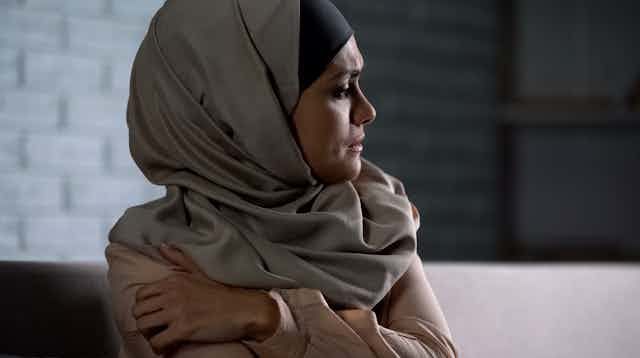Try to imagine for a moment, if you can, how it must feel to be so scared for your life that you are forced to flee your home and seek asylum in another country.
Now imagine you are pregnant while doing this.
You might hope that when you reach the country of asylum you would be out of harm’s way. But our new research has found this may not always be the case. Our findings show how pregnant women can fall through the gaps in terms of welfare support and housing. And how, in some cases, delays in processing welfare benefits and finding accommodation can leave vulnerable women without food or anywhere to live for the duration of their pregnancy.
Going hungry
We worked with researchers (Rosanna Ellul and Rose McCarthy) at the Refugee Council, a UK based organisation that works with refugees and asylum seekers, to carry out in-depth interviews – with the help of an interpreter. We spoke with six migrant women in the UK who had experienced destitution in their pregnancy. We found they were hungry, homeless and their health had suffered as a result. And although this was a small, local study, it shows the implications of gaps in the support system for pregnant migrant women.
All the women we talked to told us about not eating for long periods of time. Hunger was made worse when women could smell food but had no money to buy it. One woman described how she was staying in a friend’s house where they cooked her meals, but she struggled to eat the food:
I vomit a lot, I can’t like…keep [food] down…and because I don’t want to disturb people…whatever they cook I try [to eat]. I tried to push myself"
Pregnant and homeless
We found that women “sofa surfed”, living in cramped conditions, sleeping on a settee or on the floor. In the daytime, they felt obliged to leave the house so as not to become a burden to the residents. One woman, who was thrown out of her home by her partner due to being pregnant, slept in the internal stairwell at the entrance to the flats she had lived in and walked around the streets in the daytime.

Some women were provided temporary housing, but this was often dirty and unsafe. One woman described the racist abuse she received from her neighbour in a hostel where she was housed temporarily:
The lady, she was staying in the opposite room, if I come out the room she start calling me names and, that’s the only entrance. I was so scared…she did it three times, she was screaming, she stands on the stairs blocking me.
These temporary living arrangements also led to interruptions in health care. One woman was moved to a new city which led to her diabetes becoming unstable – a potentially life-threatening condition, particularly when pregnant.
Declining health
All the women said their health deteriorated during this time. Their mental health worsened due to their asylum experience and they described feeling helpless, vulnerable, desperate and ashamed.
The women also spoke about how they felt scared for their baby’s future. Some women talked about missing their own mother and feeling very depressed and suicidal. One woman told us how she felt socially isolated and alone when her baby was born:
It broke me a lot because I was lonely…no-one just to give me just a five-minute break, [or say] ‘can I just hold the baby for you?’
The women’s physical health also suffered. They experienced weight loss due to a lack of food, and insomnia and headaches were commonly experienced. One woman described how she developed pelvic pain that led to her having to crawl to move around. Another woman described how her diabetes was poorly controlled due to not being able to eat regularly.
Searching for support
One woman visited her local authority every day with all her belongings, begging for somewhere to live. Another woman described how social services threatened to take her baby away when it was born, but would not help her find somewhere to live.
Women found support in local churches and charities. And although charity workers went “above and beyond” trying to find equipment for the baby, food and medicines, this help was limited. The women also told us about the kindness of neighbours who helped them:
A gentleman, who used to bring the shopping round every week…that really touched her heart – she classes him as a grandad…he would come round and give her £20, just so that…it would be a help toward her transportation, because she had no money obviously
Without the help of local volunteers, charities or kind neighbours, it is questionable whether all of the women in our study would have survived this period. Clearly then, as these women’s stories show, something needs to change to ensure migrant mothers and babies are not put at risk of destitution.

